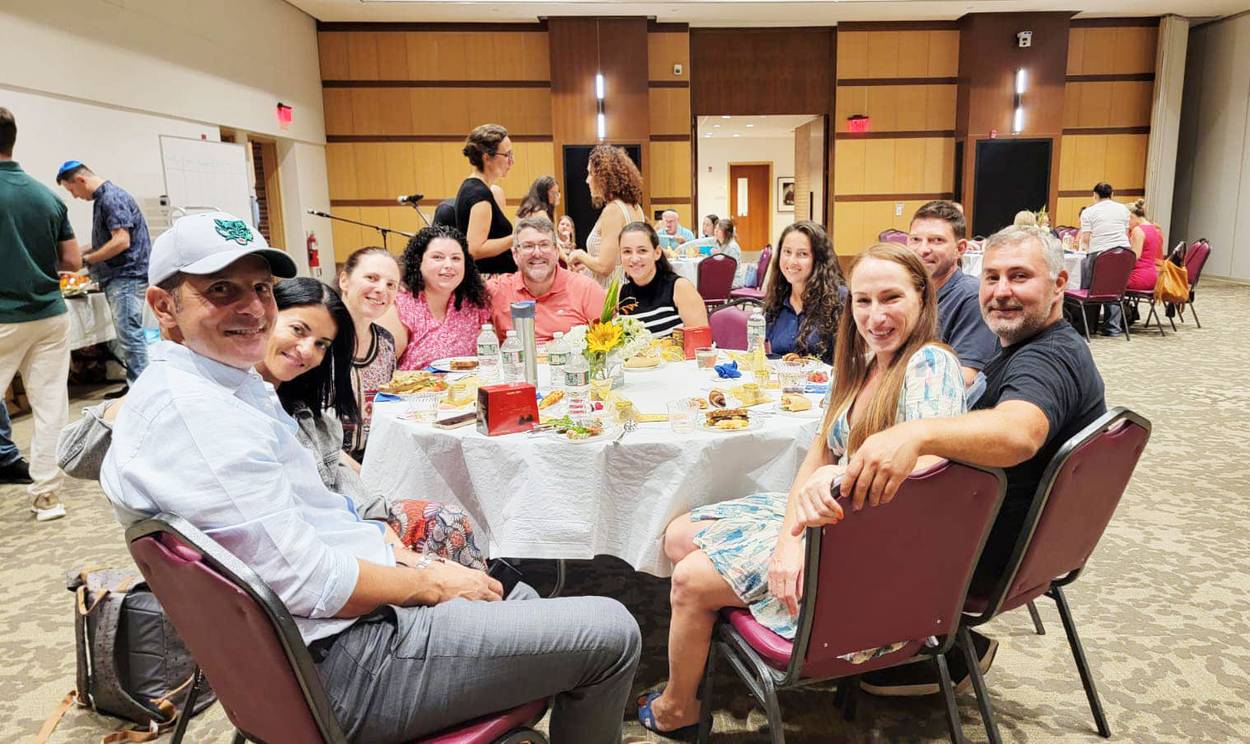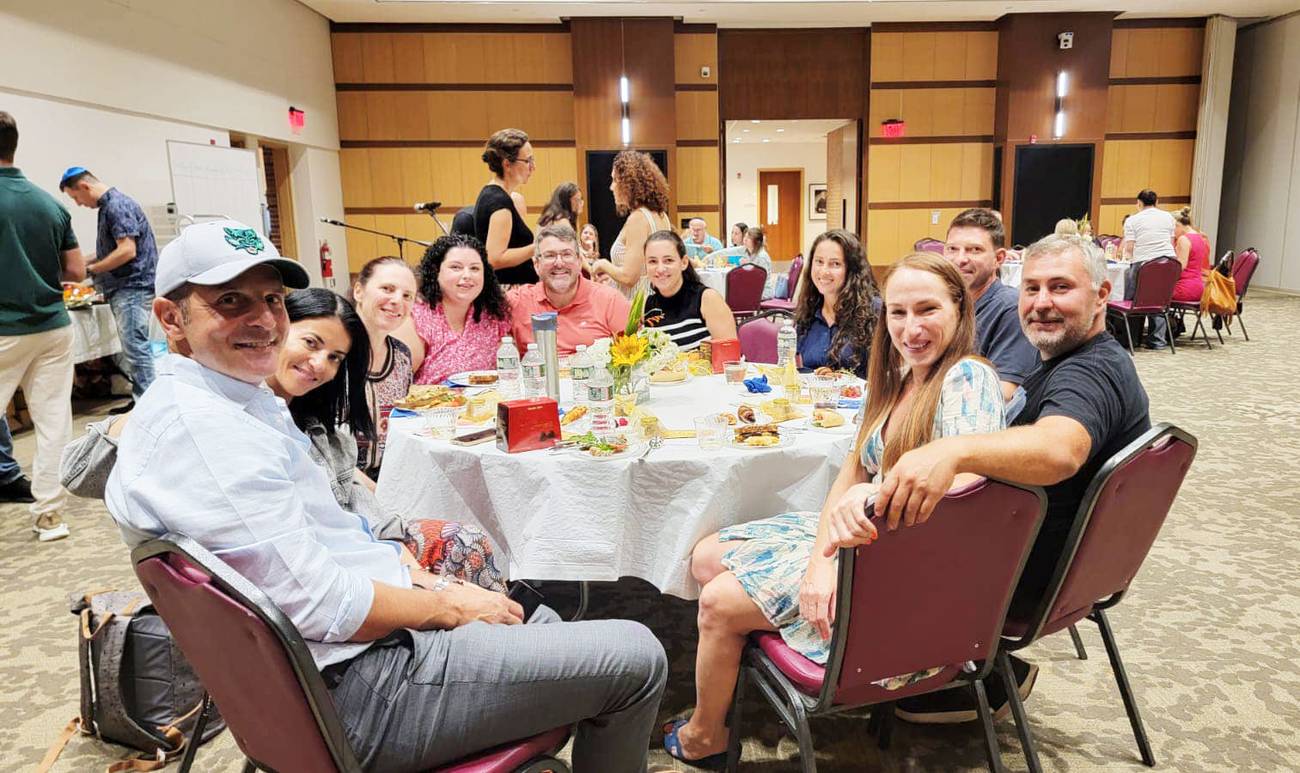Let Russian Jews Lead
Russian-speaking Jews know the alternative firsthand. They know that if the totalitarian left takes control of this country, there will be no other refuge.

Courtesy JPA

Courtesy JPA

Courtesy JPA

Courtesy JPA
Two weeks after Oct. 7, I found myself in a large, brightly lit conference room of a prestigious law firm located at the top floor of a gleaming midtown Manhattan tower. Sitting around the long table were members of the Jewish Parent Academy, an adult Jewish education and leadership nonprofit that seeks to empower “Generation 1.5” of Russian-speaking Jews “to take ownership of their multilayered Russian-Jewish-American identity, and become active contributors to their communities through leadership, volunteerism and philanthropy.”
JPA was founded in 2015 by seven Brooklyn parents—graduates of elite Jewish leadership programs who wanted to communicate what they learned to others in the community. For some time, it remained a local Brooklyn initiative. But over the last few years, the organization has blossomed and expanded, with new branches opening up in Manhattan, Long Island, and New Jersey. Many JPA graduates are first-generation immigrant success stories, with impressive careers in the corporate world. It was thanks to one of them that we were now sitting in this swanky conference room, with my lecture about Soviet roots of contemporary left antisemitism serving as a springboard into a free-flowing discussion (more accurately, everyone talking at each other at the same time) about the American Jewish future.
The mood and conversation in this room felt notably different than at other talks I gave that week. Contrary to their American-born peers, Russian-speaking Jews, or RSJs, who gathered in this room somehow felt less … paralyzed. While much of the American Jewish community was preoccupied with the implications of Oct. 7, which were just now coming to light (millions of dollars spent on wrong causes; their kids getting into Ivies that were now erupting in pro-Hamas orgies; the realization that anti-Israel propaganda might have something to do with antisemitism after all), this group had no feelings of betrayal to process and no shattered alliances to grieve. They had always seen American Jews’ progressive commitments as a quirk at best and a mistake at worst, and no one needed to convince them that Soviet-born, anti-Zionist rhetoric was dangerous. When disaster came, they channelled their shock and energy directly into action.
If you stopped following the Soviet Jewry story after the USSR fell apart, you’d be surprised to meet this group. No longer your badly dressed, uneducated cousins who needed primers on how capitalism works and what one does at services, Russian-speaking Jews have become successful, confident, and unapologetically American in the way that only immigrants seem to be these days: deeply appreciative of opportunities the country offered them, conscious of America’s place in the world, and committed to upholding American values for themselves and their kids.
Many have also acquired a Jewish identity that represents the best of Russian- and American-Jewish aspects, with a firm commitment to Israel and a sense of belonging to the Jewish people. It is no small feat: Soviet Jewish identity was as notoriously strong as it was “thin.” Russian Jewish immigrants who were brought to the U.S. as children understood that if they wanted to pass their Jewish identity to their American-born kids, it was not enough for them to “feel” Jewish. They needed education.
And they needed to find commitment within themselves. “If I don’t do Rosh Hashanah or if I don’t do Passover, then nobody in my family is going to celebrate it,” I was told by Alla AI, a board member. Having grown up in a typical Soviet nonreligious family, AI is committed to creating the experience of growing up Jewish for her kids. And because she does it for her kids, “grandparents come, and my sister comes and my husband’s sister comes. You build that family bond and that community.”
Our collective history combined with this newfound knowledge has endowed Russian-speaking Jews with a special sense of responsibility, and a willingness to fight.
In May of 2021, when a Jewish man got beaten up near the New York public library, half a block from AI’s office, she raised the issue at her firm, which until then was silent. She helped found a Jewish “employee resource group” at her firm, sponsoring events with Jewish speakers, celebrating holidays and speaking up on critical issues. On Oct. 24, she wrote a blog titled, “There are no words, only tears,” and posted it on LinkedIn—specifically for her professional contacts to see it. “The fact that people are afraid to comment and people are afraid to ‘like’ it, but instead reach out to me privately, it’s very, very telling,” she said.
In my recent meetings, American-born Jews often ask me about how we can improve our message with regard to Israel. I tell them my friends in JPA think less in terms of PR and more in terms of long-term commitments. They see a glaring gap in American Jewish education—a lack of knowledge about Soviet and Soviet Jewish history, communism, and anti-Zionist propaganda. They believe this lack of education is one reason many American-born Jews have fallen for the woke mantras of recent years. “Every school is covering its butt right now,” talking about “anti-hate training” and how “we’re going to have more diversity and inclusion, blah-blah-blah,” said Yelena Pogorelsky, JPA’s executive director. Instead of this hogwash, she is demanding something fundamental. It’s a disgrace, she says, that the core K-12 curriculum doesn’t have any teaching about Jews and Israel: “At the very least, people should know that Judaism is at the core of Western civilization, and there is zero understanding of that.”
That this passionate defense of Western civilization comes from the mouths of first-generation, Russian-speaking immigrants is a gift—because Russian-speaking Jews know the alternative firsthand. They survived Lenin’s, Hitler’s, and Stalin’s “solutions” to the “Jewish question.” They have survived the destruction of the Jewish intelligentsia, a decimation of their religious and cultural institutions, and an erasure of their collective memory. For them, the fight for Israel is intertwined with a fight for America. They know that if the totalitarian left takes control of this country, there will be no other refuge.
Mainstream Jewish organizations have started paying attention to this group, but not enough. “They need to stop thinking of them as token Russians and really start listening,” Pogorelsky said. “This is not a diversity effort anymore. We have real experience and a real perspective to share.” We need it now more than ever.
Izabella Tabarovsky is a Tablet contributor. Follow her on Twitter @IzaTabaro.